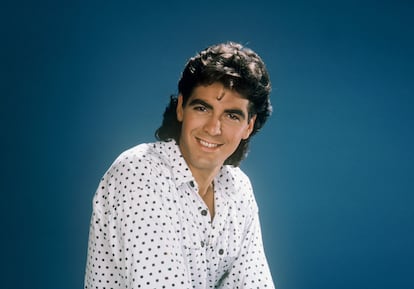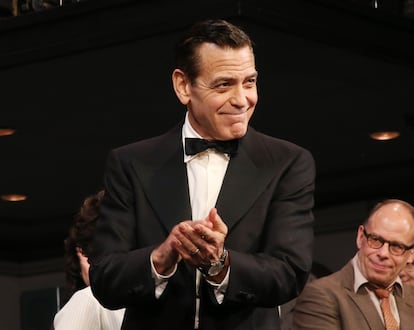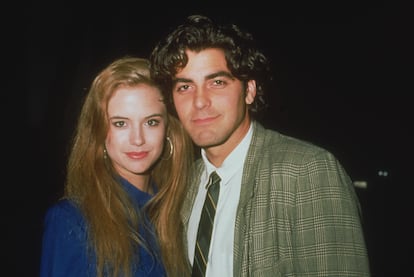To assess the true power of George Clooney, 64, one need only mention the fact that a guest essay he wrote in The New York Times ultimately led to Joe Biden’s withdrawal as a candidate for the presidency of the United States. His influence goes beyond the box office, which he has conquered with hits such as The Perfect Storm (2000) and the Ocean’s Eleven saga (2001-2007). His unusual transition from television to film worked out well, and he has just starred in his first play, Good Night, and Good Luck, a script based on the film he wrote and directed in 2005. Already the biggest non-musical hit on Broadway, it has earned the Hollywood heartthrob a Tony nomination, adding to his long list of awards.
Clooney has returned to the stage for the first time since playing a male prostitute and drug dealer in Vicious in 1986, a play about the life of Sex Pistols member Sid Vicious. His role is very different this time: he plays the famous journalist Edward R. Murrow, a moral figure who clashed with the infamous U.S. senator Joseph McCarthy who, hiding behind an anti-communist crusade, launched a witch hunt in Hollywood that ostracized a good number of members of the movie industry. The project rekindled the nerves he once felt at the start of his career, and he received valuable support from his close friend Julianna Margulies — best known as nurse Carol Hathaway on ER — who is currently starring in a Broadway production and offered him advice he deeply appreciated.
If 20 years ago Clooney’s motivation for making Good Night, and Good Luck was his disillusionment with the Bush administration and its role in Iraq, today it’s clearly Donald Trump’s policies that drive him. Clooney has taken a combative stance toward Trump — one that the former president has returned in kind.
The U.S. president has called him a “second-rate movie star,” although perhaps he should be grateful to the actor: his letter in The New York Times eliminated his main political rival and forced an emergency solution that facilitated his second victory. Not all Democrats appreciated the sincerity expressed by one of their main donors, but the actor has no regrets. “I was raised to tell the truth. I had seen the president up close and I was surprised. It seemed to me that there were a lot of people who took a back seat, a lot of cowardice in my party, and I wasn’t proud of it,” he told the program 60 Minutes.

According to the book Original Sin, written by CNN anchor Jake Tapper and Axios journalist Alex Thompson, the trigger for the letter was Biden’s failure to recognize the actor during a fundraising event, despite the fact that they have been friends for more than 15 years. Clooney’s interest in politics is not new: his father, the journalist Nick Clooney, was very politically involved and even unsuccessfully ran for Congress as a Democrat.
Despite the deep subject matter his play addresses, what has caused the most talk about his Broadway debut is… his hair. In a sense, it’s refreshing to see that aesthetic issues don’t just overshadow women’s work. Playing Murrow has forced him to cover up his iconic gray hair, something he wasn’t too keen on.
“My wife is going to hate it because nothing makes you look older than when an older guy dyes his hair,” he told The New York Times. Being a regular presence on Sexiest Men Alive lists, Clooney is accustomed to hearing comments about his physique, although he’s aware that his time as a leading man has come to an end, as he acknowledged a couple of years ago. After starring in Ticket to Paradise with his good friend Julia Roberts, he stated that it would be his last romantic comedy. “I’m not trying to compete with 25-year-old leading men. That’s not my job,” he confessed during an interview on CBS.

His image as a playboy was reinforced by a private life filled with short-lived but highly publicized romances. In the early 1990s, he was married for four years to actress Talia Balsam, but all of his subsequent relationships were fleeting. He dated Kelly Preston, Cameron Diaz and Renée Zellweger, among others, but it’s always been a joke that his longest relationship was the one he had with his famous pig, Max.
Everything changed when human rights lawyer Amal Alamuddin came into his life. His manager, Bryan Lourd, Carrie Fisher’s ex-husband, warned him before they met. “I’m telling you, you’re going to marry her,” he declared. Clooney didn’t believe him until he saw her. “I didn’t really think I’d have much of a chance with her because I was 17 years older and she seemed to have everything she needed.” The rest is history. They’ve been married for 11 years, and his admiration for her seems to know no bounds. “I’m proud to be her husband. I’m proud to be the father of kids with her,” he confessed to The New York Times. The recalcitrant bachelor is now a loving father to twins, “a punishment from God for how much I joked about having children.”
Despite his high-profile life, he is very strict about his privacy. He doesn’t use social media, and his run-ins with the tabloids have been frequent. In the mid-1990s, he took on the Paramount program Hard Copy, which aired “stolen” images of celebrities, and promoted a boycott of the sensationalist (and now defunct) Gawker website, which consisted of sending them fake news, although this doesn’t seem to have significantly affected the website’s credibility.
Although Clooney could be considered a nepobaby (his father was very famous in the 1960s and he is the nephew of the actress and singer Rosemary Clooney), he didn’t have it easy at first. He made too many pilot episodes for series that went nowhere and he appeared as a bit character in many sitcoms of the 1980s, from The Golden Girls to Murder, She Wrote, while trying to get his foot in the door in the film industry, even if it was with such uninspiring productions as The Return of the Killer Tomatoes (1988).

He’d almost given up when ER came along, featuring Dr. Doug Ross, the character that made him a star and earned him two Emmy nominations and three Golden Globe nominations. An exceptional series with audiences in the millions, he landed it by chance. According to his showrunner, John Wells, as soon as Clooney heard about the project, he begged for a role. It appears that the actor had all the Warner Bros. female assistants in his clutches: “He gave them flowers, chocolates, he was a real flirt, and that’s how he always knew when there would be auditions and for what role.”
His character was meant to be an insensitive womanizer, but at his suggestion, he became, in his own words, “a serious flirt.” A nuance that made him the official heartthrob of 1990s television, but he aspired to more. Steven Spielberg told him during a visit to the set of ER: “If you stop moving your head around, you’ll be a movie star.” He wasn’t wrong.
He made the leap to movies with flying colors. Dressed in black and sporting a massive tribal tattoo, he went from saving lives to taking them in From Dusk Till Dawn (1996). He proved his mettle as a classic heartthrob in One Fine Day (1996) alongside Michelle Pfeiffer, and played the controversial nippled Batman in Joel Schumacher’s Batman & Robin (1997), one of the few blots on his career. “I always apologize for Batman & Robin,” he joked on The Graham Norton Show. “Let me just say, I actually thought I destroyed the franchise until someone picked it up years later and changed it. At the time, I thought it would be a great career move.” But his time in the Bat-franchise also had something positive: “It taught me how important a good script is.”
He was one of the few partners with whom Jennifer Lopez had good chemistry, in the elegant Out of Sight (1998), which started his fruitful professional relationship with Steven Soderbergh, and in Three Kings (1999) he began to realize the privileges that came with being a star. When director David O. Russell, famous for his arguments with anyone near his sets, yelled at him, “Why don’t you worry about your terrible acting?” he made a phone call to Warner Bros. that had the effect, according to Clooney, of stripping him of his directorial authority. “David sat there and sulked for the last two weeks of shooting, and then we wrapped.” He got along better with the Coen brothers, with whom he worked on O Brother, Where Art Thou?, Intolerable Cruelty, Burn After Reading, and Hail Caesar!.

Clooney was familiar with box office success and had received the Sexiest Man Alive award, but he earned critical respect by forgoing his good looks. He gained weight and gave up his elegant suits to play former CIA agent Robert Baer in Syriana (2005), and his excellent work earned him the Oscar for Best Supporting Actor. He also had an accident that still gives him trouble. During a stunt, he hit his head on the concrete floor and began leaking spinal fluid from his nose.
“I was at a point where I thought, ‘I can’t exist like this. I can’t actually live,’” he told Rolling Stone. “I was lying in a hospital bed with an IV in my arm, unable to move, having these headaches where it feels like you’re having a stroke, and for three weeks, I started thinking, ‘Maybe I have to take drastic measures.’” Surgery allowed him to survive, but he still suffers from severe headaches to this day.
After his recognition as an actor, it was time to get behind the camera. His directorial debut, Confessions of a Dangerous Mind (2002), was critically acclaimed, but to finance Good Night, and Good Luck (2005), he was forced to mortgage his house: no one wanted to take a risk on a black-and-white film. He received six Oscar nominations, including two for himself, one as a screenwriter and one as a director. As a producer, he hasn’t done badly either. He picked up an Oscar for Argo, and his other credits include such interesting titles as Far from Heaven, August and Money Monster.
Although he’s sometimes hinted that he’d stop being in front of the cameras after turning 60, his busy schedule suggests otherwise. The recent Wolfs, in which he starred alongside his friend Brad Pitt, has sparked rumors of a return of Danny Ocean’s band, and he also has Noah Baumbach’s Jay Kelly in the works, in which he’ll co-star alongside Adam Sandler and Laura Dern. What he doesn’t plan on doing, despite his undeniable influence, is entering politics. Many Democrats have asked him to take the plunge, but he is resolute in saying no. In fact, when Trump urged him a few months ago to stop meddling in politics and return to television, he said he’d be willing to make that sacrifice… if Trump did the same.
Sign up for our weekly newsletter to get more English-language news coverage from EL PAÍS USA Edition


